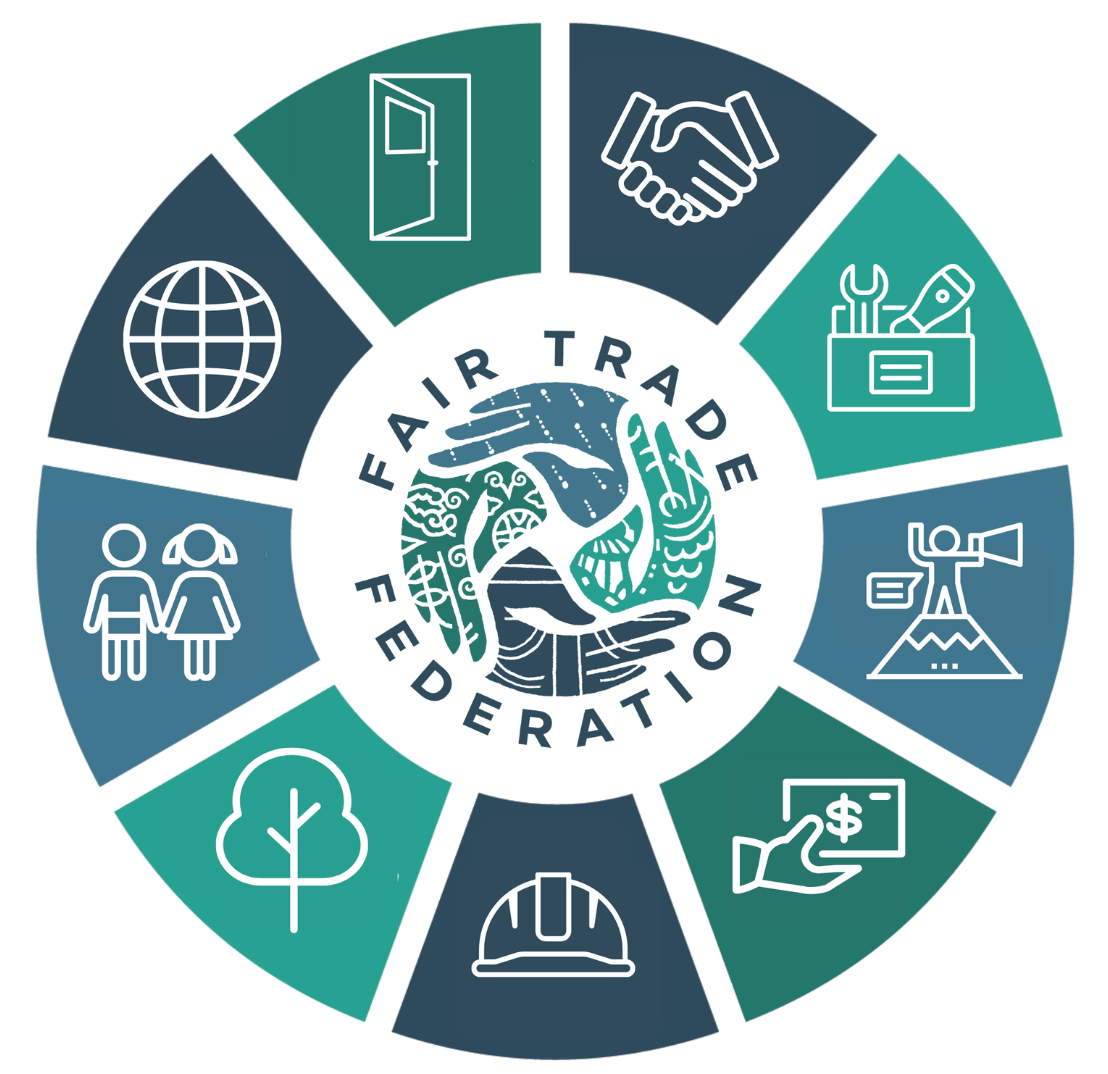A Conversation on Fair Trade with Mr. Kenny
By Rebecca Liu ’25, Head Editor-in-Chief; Edited by Rawnie Sun ’25, Head Editor-in-Chief

What is fair trade? Many people only have a vague conception of what fair trade is or have never even heard of the concept. When I asked some people in the Iggy Learning Commons, only three people told me in semi-clear terms what fair trade was, and even then, they did so with uncertainty. The rest were unable to answer or didn’t have an answer. Even I had to take the time to consider what the term meant to me. I thought, doesn’t it just mean ensuring that the products I buy are sourced ethically and those that produce it are treated well? I could’ve never imagined how much deeper this topic would take me, discussing not just fair treatment of workers, but how consumers interact with conflicting interests of equity and efficiency, how to change behaviour, and the importance of deliberate awareness.
In honour of October being Fair Trade Month, I approached Mr. Kenny, our beloved IB economics teacher. When asked about what fair trade meant and why it’s important, he told us:
“The basic premise behind fair trade is to reduce labour market exploitation and improve the standard of living. Fundamentally, the key premise is to improve the standard of living in developing countries and to have a more equitable working relationship with developed countries. However multinational corporations are driven by profit maximization, and one of the biggest challenges in developing countries is they have weak institutional and regulatory frameworks that these multinationals take advantage of. So, perhaps the whole idea of fair trade and why it matters is that multinationals should be held to account and unable to exploit the weak, regulatory, institutional, and legislative framework of these developing countries. But that change has to be fundamentally driven by the consumer.”
But as we discussed this concept with Mr. Kenny, we discovered the difficulties of fair trade.
“Unfortunately, fair trade can sometimes have little weight as it has to be driven by the consumer. Change has to be driven by your purchasing patterns and behaviours. There’s this interesting notion in economics that there’s a difference between declared preferences and revealed preferences. Declared preferences are like, ‘Yeah, I care about sourcing ethically, sustainably, and responsibly.’ However, revealed preferences are the fact that consumers continue to purchase products from companies that don’t have any degree or any real corporate social responsibility. Unfortunately, as a consumer, you care about getting products that are high quality and low price. And by default, if you’re buying fair trade products, you’re agreeing to the notion that you’re willing to pay a premium for the product to ensure that this company is adhering to practices of fair trade and reinvesting in communities in developing countries. It is reinvesting in people and ensuring that they’re not taking advantage of lax regulations in the labour market concerning environmental regulation across the board.”
I found this to be a fascinating indication of the practicality of pushing for fair trade. Indeed, it is undeniable the crucial importance of ensuring that individuals are treated well for their work, improving their standard of living. However, reality, especially when comparing our good intentions to realistic actions, can be sobering. So I asked if he thought there is a role for governments and international organizations to play in pushing for the convergence of declared and revealed preferences.
“I think it starts with the governments of developing countries. A multinational corporation is simply going to take advantage of what regulations and laws that they’re bound by. And the fact that these developing countries have weak regulations and institutions, multinationals are just playing by the rules of the game. A lot of the time, these developing countries also have corrupt governments that disproportionately benefit from multinational operations rather than those benefits being passed on to the people within the country. The ideal state is when a multinational operates broadly, reinvests in communities, creates jobs, facilitates educational transfer, and generally raises the standard of living. In other words, when they’re focused on sustainable business efforts within the country. But a business is only going to do that for one of two reasons. They’re either going to do it because consumers care about them implementing these measures considering corporate social responsibility, and that would be signalled through consumer purchasing patterns, or they’re forced to through government regulation and legislation. Otherwise, why would they? If consumers don’t care about fair trade or buying products associated with fair trade, and government regulations don’t have an incentive, then fair trade is extremely difficult to establish.”
I then asked about the ideal state Mr. Kenny brought up. I asked if he thinks the ideal state is possible to be reached, and if so, how.
“I think it is possible to reach that. But it really has to be at the country level. But certainly, developed countries play a role in helping developing nations establish that regulatory and institutional framework. Further, unfortunately, many countries, have other pressing issues regarding international trade that they prioritize. One of the biggest impediments to developing to development in low-income countries is a lack of access to markets for their products. Agriculture is a classic example of that, where most developed nations have massive protectionist policies in agriculture to support their domestic agriculture industry. But these are the industries where these developing countries have a comparative advantage. So reducing those trade barriers, in agricultural industries specifically, would have a massive impact on promoting economic development around the globe.
And again, I think it’s a bit of a government problem, but also a consumer problem. You know, if you cared about the environment, you would probably gravitate towards less carbon-intensive products. However, the realities are different in terms of what consumer purchasing patterns are. Part of that might be because people are not cognizant of the products they buy, of how and where they’re manufactured. But part of that is, I think, apathy. People are not willing to pay a premium for it because by default, buying a premium means you’re reducing your standard of living in order to raise the standard of living of people elsewhere. And around the globe or just within our own nation, there are massive concerns about our own food security. So, I think somebody concerned about putting food on the table, like millions of Canadians, would not be that concerned about where their coffee was manufactured or if it’s fair trade. It’s really not that fair trade doesn’t have merit, it’s just a matter that it has to be driven by the consumer. And if consumers care about the product, then that will drive businesses to make better decisions that are more sustainable. And to complement that, there do have to be improvements in the regulations and the institutional framework in developing countries to go alongside that.
So it’s always multifaceted in public policy. But it does have to be driven by the consumer. It also has to be driven by local governments. But developed countries certainly have a role in facilitating that and supporting these nations.”
I found Mr. Kenny’s examination of consumer apathy fascinating. So I asked him, “Do you think we could change the apathy of consumers? Or are they always going to be self-interested?”
“Well, let me turn the question back at you, right? Do you, when going to a store and purchasing products, have fair trade been a large, or even part of your decision-making process? It has a good intention, but it often doesn’t have much weight on our day-to-day decisions. And for some individuals where it does, those tend to be people who are already living a very comfortable lifestyle. Whereas, if we look at the current average Canadian or American, we’ve had several years of a lack of housing affordability and a lack of food security. I don’t know that that is foremost on their mind in terms of consideration, in terms of what products they’re purchasing.
It has to come directly from the public caring and making active changes. However, companies will take advantage of regulatory arbitrage. And it’s their right to do that because they’re operating in the rules of the game. Why wouldn’t they? At the end of the day, it’s a corporation’s objective to maximize shareholder wealth and make profits. It’s like ethical investing, right? You can invest ethically, it just hasn’t caught much traction like fair trade. It doesn’t mean it won't, but people have to care. And you have to get people to care.”
All this discussion felt genuine and well-said, but it still makes me feel a bit down about the future of fair trade. So, I asked him what he thinks about the future and if he saw a metaphorical light at the end of the tunnel.
“There are lots of companies that have had recent success concerning fair trade initiatives. And there are complexities in that. The idea is that when a company has global operations, they are operating in these developing nations in a way where prosperity and opportunity are shared. And that would be the ideal aspirational goal of businesses. In general, though, most multinational corporations are very conservative. They are highly focused on profits, at the expense of sustainability and development. But, it’d be nice to have a world where we could have both. That you have a profitable enterprise that reinvests in communities and people, creating shared prosperity and opportunity.”

And progress to both sustainable yet profitable businesses and government is being made. In 2008, Wales became the first free-trade nation. Working with various international organizations like Fairtrade International and World Fair Trade International, Wales is committed to supporting fair trade groups nationwide. As of 2008, 55% of all towns and counties in Wales had a fair trade group, including 1,000+ volunteers, 380 schools, and all 22 counties.
The Niagara Region town of Port Colborne, Ontario, Canada has been a certified fair trade town for 15 years and is the only current designated town in Ontario. Since the 2000s, Fairtrade Canada has certified 26 municipalities, with 15 current fair trade towns and 18 fair trade universities. Many towns lost their certifications during the pandemic, but it also generated interest in how supply chains work, creating avenues for more awareness.
If you are interested in supporting fair trade, try to:
- Buy certified products as much as possible
- Join a local fair trade council or community, or push for the start of one of your own
- Support fair trade businesses
- Continue to stay informed on the topic
- Advocate and participate in pushes for changing legislature



